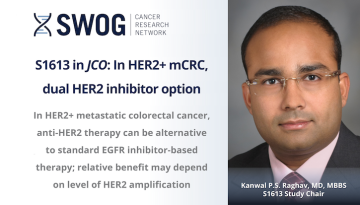Piling On with a Different Type of Toxicity
Of all the toxicities our patients can experience in response to treatment for their cancer, one of the most frustrating ones is financial harm. It’s frustrating in part because it seems as though having health insurance should largely prevent it. Unfortunately, this is often not the case.
In fact, SWOG work published last week in the Journal of the National Cancer Institute (JNCI) reports that almost three-fourths of patients with metastatic colorectal cancer who enrolled in trial S1417CD experienced major financial hardship in the first 12 months after their cancer diagnosis. The kicker: virtually all of those patients had health insurance.
S1417CD was led by Dr. Veena Shankaran, a SWOG investigator based at the Fred Hutch. Of the 368 eligible patients enrolled to the study, fully 361 (98 percent) had some form of health insurance. Nonetheless, within a year of diagnosis, 71.3 percent reported major financial hardship conditions, defined as a patient’s experiencing an increase in debt, taking on a new loan, selling or refinancing a home, or seeing a drop in income of at least 20 percent.
Are we sure this study definition of major financial hardship reflected actual hardship in the lives of these patients? Well, evidence suggests it did. Those patients who reported major financial hardship at the three-month point tended to report drops in quality-of-life measures and worse social functioning at the six-month mark.
Shankaran’s findings are the first reporting the prospectively measured financial impact of cancer treatment in a socioeconomically and geographically diverse nationwide group of patients with advanced cancer. But other sorts of findings on the outsize financial burden imposed on patients with cancer come out regularly.
A report that made a splash about two months ago estimated that, in 2019, the economic burden associated with cancer for patients in the U.S. totaled around $21.1 billion, which included out-of-pocket costs and lost-time costs. It’s a sobering figure. Even NCI Director Dr. Ned Sharpless tweeted about it.
The lead author on that report, Dr. K. Robin Yabroff, also led a team that wrote an editorial in response to Dr. Shankaran’s article in JNCI last week, suggesting that health insurance may no longer be sufficient to protect patients from health-care driven financial hardship.
The editorial writers also note that screening for financial difficulties at only a single visit isn’t sufficient – the percentage of S1417CD patients experiencing financial hardship increased throughout the 12-month post-diagnosis period, with only about one-quarter of patients reporting hardship at three months, while almost three-quarters reported it by the 12-month mark. They go on to provide a set of recommendations for steps that providers, cancer centers, policy makers, and researchers can take to address this situation, including considering reporting financial hardship as an adverse event when evaluating new therapies.
Dr. Shankaran and others from SWOG’s cancer care delivery committee are already addressing several of these recommendations, having applied the lessons they learned from S1417CD to last year launch S1912CD. The S1912CD CREDIT study is testing the efficacy of a financial counseling intervention in relieving financial hardship (and improving quality of life) for patients being treated for cancer. That study is now open at about 170 locations – 170 NCORP sites testing ways to remove financial toxicity from the list of challenges patients with cancer may face during treatment.
We might argue it doesn’t matter if the world’s best treatment for your cancer exists – if you can’t afford it. Studying issues like this remains at the forefront of SWOG’s research – and of fulfilling its mission.
Other Recent Stories



